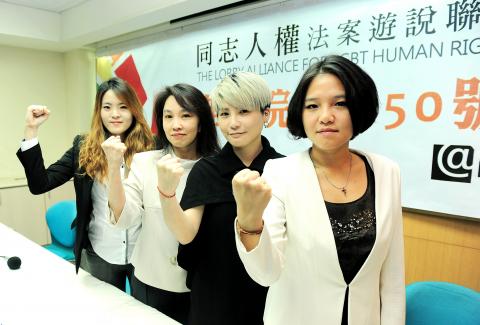The establishment of the Lobby Alliance for LGBT Human Rights was announced yesterday by the editor-in-chief of the quarterly lesbian magazine LEZS, Wang An-i (王安頤), who is also the alliance’s convener.
The aim of the alliance is to push for the passage of the equal marriage rights bill, the first reading of which has been completed, and to make Taiwan a leading country in human rights protection in Asia, the group said.
The alliance has set up an official Web site (www.pridewatch.tw) and is slated to present its first public action on May 17, the International Day Against Homophobia, by installing 100 “tombs” on Ketagalan Boulevard in Taipei to protest against the persecution of people of non-heterosexual orientation.

Photo: Lo Pei-der, Taipei Times
Wang, the openly lesbian granddaughter of United Daily News Group founder Wang Tih-wu (王惕吾), said the alliance would lobby for and promote bills guaranteeing gender equality, and encourage LGBTs to come out.
Their first task is to call on legislators to place a Civil Code-amending bill on the agenda of the legislature’s meeting over the legalization of gay marriage and for equal marriage rights, Wang said.
She added that the procession of the equal marriage bill proposed by the Taiwan Alliance to Promote Civil Partnership Rights has been delayed by legislators’ inaction, so the alliance’s next goal is to urge the conveners of the Judiciary and Organic Laws and Statutes Committee, Chinese Nationalist Party (KMT) legislators Liao Cheng-ching (廖正井) and Lu Hsueh-chang (呂學樟), to ensure its placement on the meeting’s agenda.
On May 17, the group plans to erect a symbolic cemetery for 100 people of non-heterosexual orientation who had committed suicide around the world because of persecution, including two Taipei First Girls’ High School students, who the group says ended their lives in 1994 in protest against an oppressing social environment.
Wang said this action would be taken “to commemorate these people and to accuse society of harboring lethal repression.”
Alliance spokesperson Chen Chia-chun (陳嘉君) said religious groups have been battling to stop the passage of the equal marriage bill in the legislature and calling for a special act to ensure that gay people cohabit, rather than getting married.
However, the segregation intimated by a special act is itself a kind of discrimination, Chen said, adding that the alliance’s Web site would not only make public legislators’ positions on the issue, but also continue to reveal and follow up on any type of bullying initiated by religious groups.
Alliance secretary-general Shen Yin-chun (沈盈君) called on business enterprises to follow IBM’s lead in ensuring that gay couples’ rights are the same as those enjoyed by their heterosexual employees.
Su Shan (蘇珊), the group’s chief information officer, said that because one in 10 people is homosexual, the homosexual community could have a say in the outcome of the elections if every single gay person could influence at least three people’s voting behavior.
Su made a telephone call at the press conference to Sean Lien (連勝文), the KMT’s candidate for the upcoming Taipei mayoral election, who has not yet made his stance on gay issues known.
However, the call was answered by his spokesperson, who said Lien’s team would respond after taking a closer look at the alliance’s appeals.

Taiwanese can file complaints with the Tourism Administration to report travel agencies if their activities caused termination of a person’s citizenship, Mainland Affairs Council Minister Chiu Chui-cheng (邱垂正) said yesterday, after a podcaster highlighted a case in which a person’s citizenship was canceled for receiving a single-use Chinese passport to enter Russia. The council is aware of incidents in which people who signed up through Chinese travel agencies for tours of Russia were told they could obtain Russian visas and fast-track border clearance, Chiu told reporters on the sidelines of an event in Taipei. However, the travel agencies actually applied

Japanese footwear brand Onitsuka Tiger today issued a public apology and said it has suspended an employee amid allegations that the staff member discriminated against a Vietnamese customer at its Taipei 101 store. Posting on the social media platform Threads yesterday, a user said that an employee at the store said that “those shoes are very expensive” when her friend, who is a migrant worker from Vietnam, asked for assistance. The employee then ignored her until she asked again, to which she replied: "We don't have a size 37." The post had amassed nearly 26,000 likes and 916 comments as of this

New measures aimed at making Taiwan more attractive to foreign professionals came into effect this month, the National Development Council said yesterday. Among the changes, international students at Taiwanese universities would be able to work in Taiwan without a work permit in the two years after they graduate, explainer materials provided by the council said. In addition, foreign nationals who graduated from one of the world’s top 200 universities within the past five years can also apply for a two-year open work permit. Previously, those graduates would have needed to apply for a work permit using point-based criteria or have a Taiwanese company

The Shilin District Prosecutors’ Office yesterday indicted two Taiwanese and issued a wanted notice for Pete Liu (劉作虎), founder of Shenzhen-based smartphone manufacturer OnePlus Technology Co (萬普拉斯科技), for allegedly contravening the Act Governing Relations Between the People of the Taiwan Area and the Mainland Area (臺灣地區與大陸地區人民關係條例) by poaching 70 engineers in Taiwan. Liu allegedly traveled to Taiwan at the end of 2014 and met with a Taiwanese man surnamed Lin (林) to discuss establishing a mobile software research and development (R&D) team in Taiwan, prosecutors said. Without approval from the government, Lin, following Liu’s instructions, recruited more than 70 software